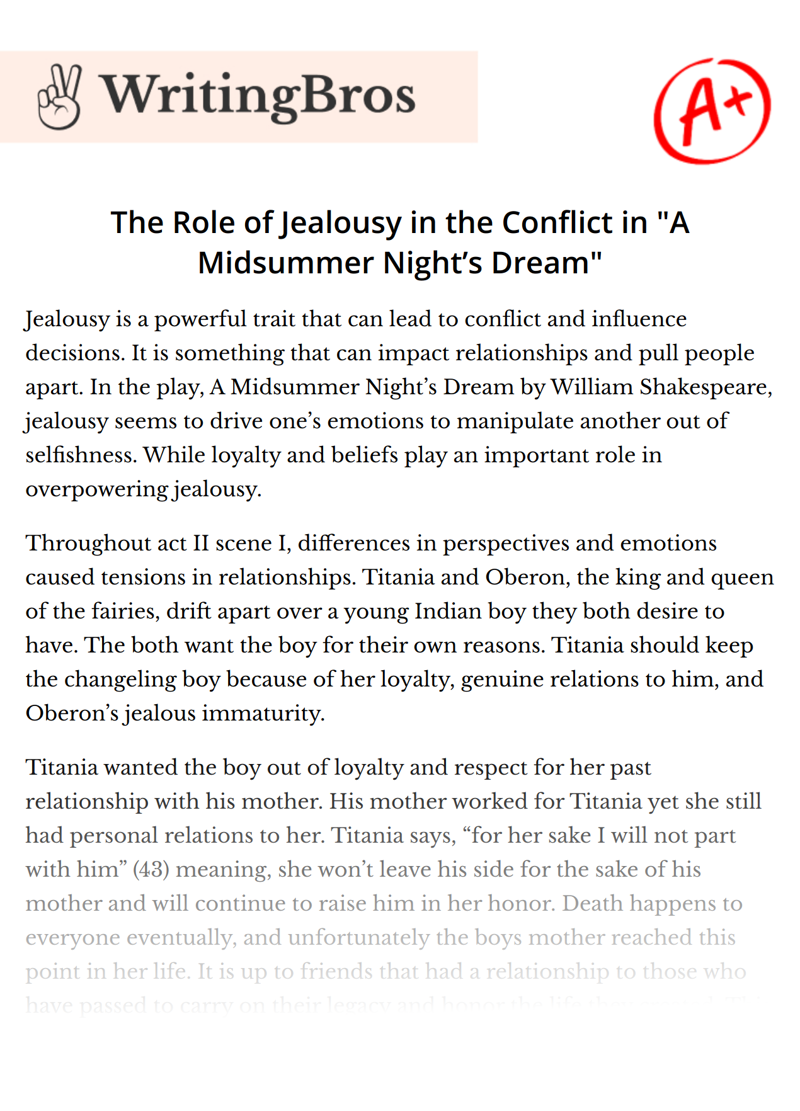The Role of Jealousy in the Conflict in "A Midsummer Night’s Dream"

Jealousy is a powerful trait that can lead to conflict and influence decisions. It is something that can impact relationships and pull people apart. In the play, A Midsummer Night’s Dream by William Shakespeare, jealousy seems to drive one’s emotions to manipulate another out of selfishness. While loyalty and beliefs play an important role in overpowering jealousy.
Throughout act II scene I, differences in perspectives and emotions caused tensions in relationships. Titania and Oberon, the king and queen of the fairies, drift apart over a young Indian boy they both desire to have. The both want the boy for their own reasons. Titania should keep the changeling boy because of her loyalty, genuine relations to him, and Oberon’s jealous immaturity.
Titania wanted the boy out of loyalty and respect for her past relationship with his mother. His mother worked for Titania yet she still had personal relations to her. Titania says, “for her sake I will not part with him” (43) meaning, she won’t leave his side for the sake of his mother and will continue to raise him in her honor. Death happens to everyone eventually, and unfortunately the boys mother reached this point in her life. It is up to friends that had a relationship to those who have passed to carry on their legacy and honor the life they created. This scene shows that Titania definitely isn’t taking the boy based on the feeling of being obligated to, but because she is a dependable and trustworthy friend to his mother who she will forever stay loyal to.
Titania developed a relationship with the mother of the boy, and feels it’s her duty to continue to raise him. In act II scene I, Titania says “so often half she gossiped by my side” (43) showing their close friendship and how they bonded with one another. Even though his mother technically worked for Titania, they still became close and overcame the stereotype of a queen and her servant. Most would think a servant would be mistreated because of this stereotype in society however, Titania took it upon herself to create this friendship. She was with his mother during her pregnancy and watched him grow from day one. Her relationship to his mother is strong and makes her connection with the boy even stronger. Titania has been by his side while Oberon hasn’t developed this interconnection to the boy. All throughout the boys development, Titania has been there. It’s like she was meant to have him and he was destined to end up with her as his mother. She has a valuable connection to him that Oberon can’t seem to settle for.
Some readers may say Oberon should have fair custody of the boy, however it is right for Titania to keep him because she has a genuine relationship with him and wants him for sincere reasons and not out of envy for attention. The play reads, “she never had so sweet a changeling” (37), representing how much Titania truly loves him and is attached to him. Titania loves the boy with all her heart and could never give him up to anyone, even Oberon. In addition, Oberon sees how much Titania cherished him and did all of these things because of false emotions that were hidden beneath the surface.
Unlike Oberon, Titania wanted the boy for mature reasons. Oberon dealt with the situation by trying to make Titania fall in love with something silly like an animal. He tried to use a spell to trick her, showing his immaturity with how he handled everything. His egocentric actions were childish towards Titania and the boy. A young boy certainly shouldn’t belong to someone who acts like this. He doesn’t deserve to be raised and taught by someone who allows things like jealousy to dictate their actions. Therefore, he couldn’t physically express that he just wanted her love for him and instead let his emotions bring out the jealousy in him, giving another reason to why it is right for Titania to keep the boy.
Titania developed a genuine relationship early on in the boys life. He was destined to be hers, and she as a loyal friend is fulfilling the responsibility to take care of him. Oberon being jealous of the attention from Titania caused him to want the boy for himself to make her have no choice but to love him instead. Titania should keep the changeling boy because of her loyalty, genuine relations to him, and Oberon’s jealous immaturity. Building strong connections leads to good relationships like his mother and Titania. Oberon didn’t have this connection and jealousy brewed within him leading him to let it influence his actions. It is important to consider the physical and emotional connections others make with each other and not let our personal needs jeopardize their relationships.
This situation is like two dogs fighting for attention. One dog may have all the attention from its owner until, they get a second one. That second dog captures the attention of the owner, leaving the first dog full of jealousy. Oberon is the first dog fighting for the owner, Titania’s, attention because of something new that came. The first dog will often act out in need of love, like Oberon did. It is important to not let your emotions take over your decision making. Jealousy is often converted to revenge when we shouldn’t let it take over and interfere with relationships, but learn to overcome it.
Cite this Essay
To export a reference to this article please select a referencing style below

